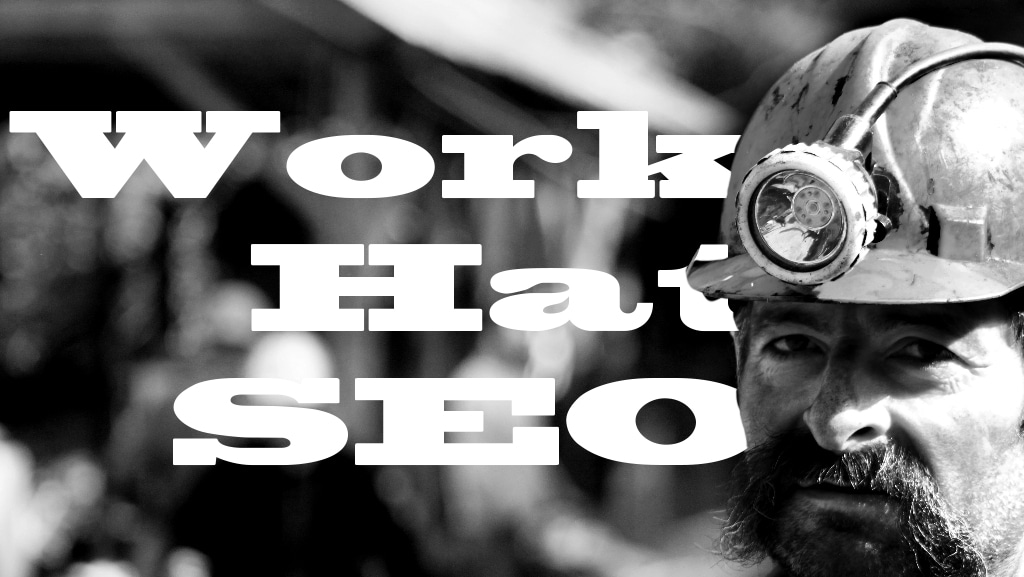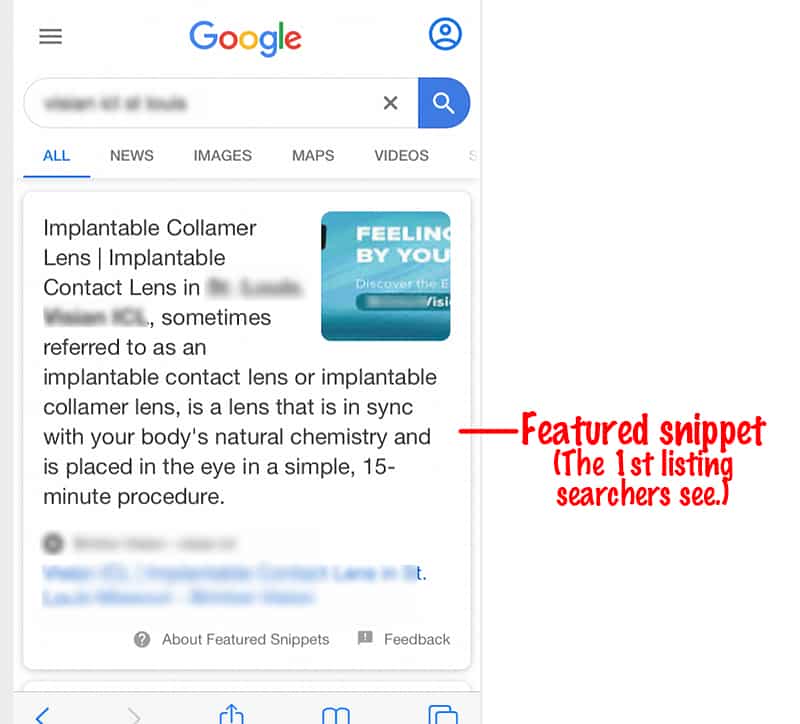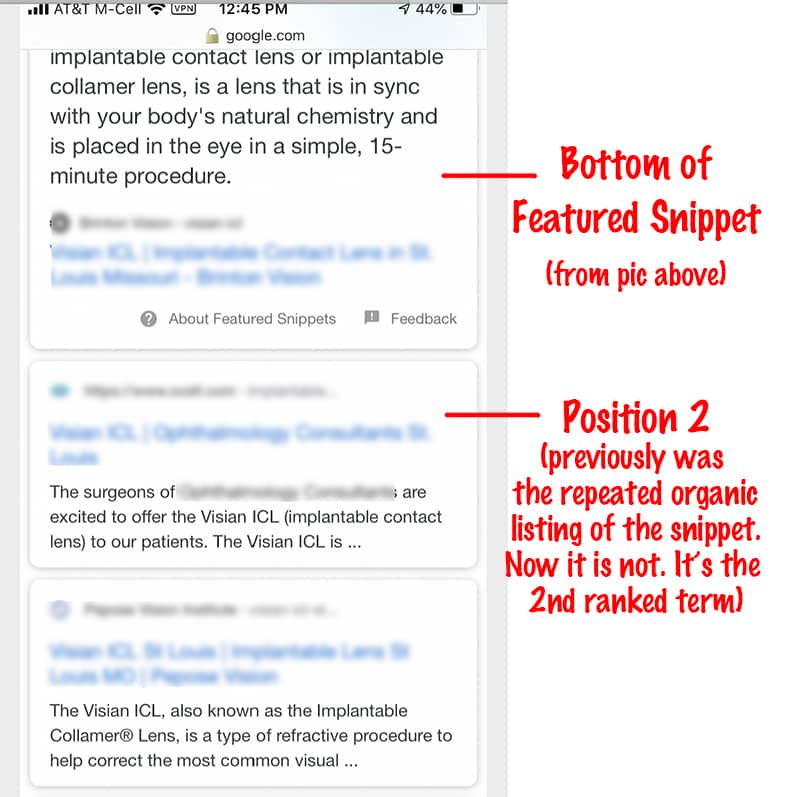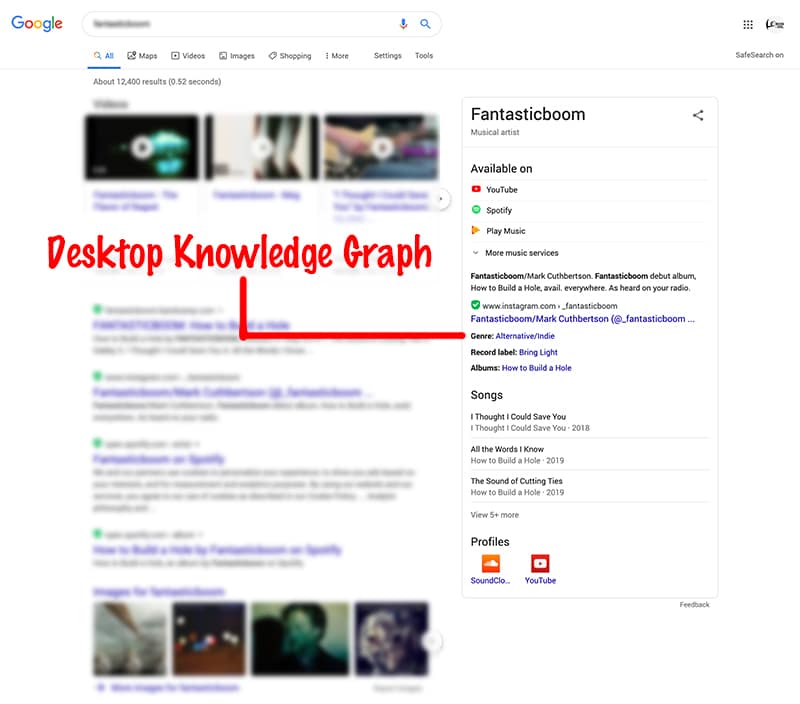If you talk to anyone who knows or doesn't know much about SEO, they'll ask, "Is that white hat or black hat SEO?" That’s the wrong question.
When most people say White Hat SEO they mean, “ Does this search engine optimization strategy completely follow search engine rules and policies?”
When most people say Black Hat SEO they mean, “Does this search engine optimization method deliberately manipulate the search engine indexes?” Sometimes they will add the criteria, “Does this break the ‘search engine rules’?”
If you are a business owner or marketing decision-maker, this article will unpack a new SEO approach using non-technical terms - Work Hat SEO™.
Almost everything done in SEO is technically “Black Hat.”
If you publish a blog post then go to your Facebook page and say, “I just published this post on my website. Go check it out,” you just, by the letter of the law, did Black Hat SEO. You did something other than publishing your content and leaving it in a vacuum for the Google Bot to crawl it and decide what to do with it.
Note, the search engines do not own the internet nor do they determine anything online beyond how they show their own search results. So there is nothing illegal or legal involved in any part of the discussion. It’s simply a question of, “How does this particular search engine respond to a prescribed SEO tactic?”
It’s time to dispense with the white hat, black hat, and even weirder gray hat SEO labels — they are meaningless. Instead, we use the term WORK HAT SEO ™.
What is Work Hat Seo?
Work Hat SEO determines whether or not to use an SEO strategy by answering the following questions:
- Does this SEO strategy work now to increase rankings and organic traffic? Answer.
- Based upon what we know about Google (and other search engines), will this SEO strategy work into the foreseeable future? Answer.
- Is there any risk associated with this SEO strategy now (or one we see as probable in the future)? Answer.
- Can we mitigate those SEO risks to the website? Answer.

Why is a Work Hat SEO strategy important for your site?
Eliminating the labels of black hat and white hat is much like removing political labels.
In the current political climate, if an idea is labeled to be Republican, then almost all Democrats will forthrightly reject it, even if it is a great idea. If an idea comes from a Democrat, then it is almost always accepted as good policy by Democrats and as bad policy by Republicans, regardless of the solution’s actual real-world merit. This prejudice goes both ways.
The same is true of SEO strategies and tactics. If someone labels a tactic "white hat”, many SEOs utilize the tactic, whether it works or not. If someone hints that something is black hat, many SEOs run like a scalded dog even if it works well and provides no significant risks.
Instead of including an SEO tactic because of its label, as a business owner or website/marketing decision-maker in your company, you should instead evaluate each proposed SEO solution on its unique merit using the four questions above.
If your search engine optimizer can articulate clear answers to the four work hat suggestions, you have most likely found a trustworthy SEO provider (granted that they also can deliver on what they say.)
As far as we know, Moon & Owl Marketing coined the term Work Hat SEO ™. It is foundational to our approach when working with clients like you to achieve improved site search rankings and more qualified organic traffic to your website.
Want to learn more? Let’s unpack each of the Work Hat SEO criteria questions…
01. Does the strategy work now to increase ranking and traffic?
The goal of organic SEO is to drive people who are searching for a solution, service, or product you offer to your website. This is accomplished by using SEO strategies and tactics to increase your rankings and the amount of qualified organic traffic that arrives at your site.

These search queries are typically either:
- Branded–they know your company name already
- Transactional–they want to buy/purchase
- Informational-they are looking for information
A good SEO should know WHY the strategy works, not just that it does work.
If you own a business and an SEO agency suggests a specific SEO strategy, do not be afraid to ask them, "Why does this strategy work?" "It just does" is not an acceptable answer.
True SEOs know why the strategy works in relation to the current search engine algorithms.
Even if you don’t know what the terms mean, you want to hear an SEO company relate each strategy to something specific, like:
- Strengthening your entity because of X.
- Creating better internal interlinking and link equity.
- Leveraging Google’s preference for showing its own properties in search.
- Creating healthy, powerful off-page backlinks.
- Setting the Google vector using Natural Language Processing.
- Increase off-site authority that powers up the main website
- To shield the site from Google penalties and manual penalties
If you don’t understand an SEO term, ask them what that phrase means. If the potential SEO agency can’t explain them in layperson’s terms or treats it like a dark secret, look elsewhere.
Just like a solid science hypothesis that is proven to be true, the SEO strategies used on your website by a search engine optimizer should be tested and proven to work in multiple, repeated scenarios. Because the algorithm is complex, undisclosed, and dynamic, it is a complex undertaking to do SEO testing. Hypothesis theory comes in to play here even if an SEO agency doesn't use that term or realize they are using it.
Hypothesis Theory and SEO
This gray section is for those who like to nerd-out a bit. However, it is important to understand how your SEO agency works on your behalf. With any website, the SEO hypothesizes why a particular strategy may or may not work.
Hypothesis:
- i) X tactic causes a change (+/) in ranking/traffic.
- ii) X tactic does not cause a change (+/) in ranking/traffic.
They then apply that SEO tactic to your website which either improves things, does nothing, or actually makes things worse.
What you want from your SEO:
- a) X tactic is said to cause a change (+/-) in ranking/traffic, and it does have an effect.
- b) X tactic is said to not cause a change in ranking/traffic, and it does not have an effect.
If your SEO properly understands a) above, the work your SEO agency is doing will properly have the effect to help your online growth and won’t waste time on things that don’t mover the needed.
If your SEO properly understands b) above, your SEO agency won’t be wasting your money or their time on things that do not work or affect your ranking.
What you do NOT want from your SEO:
The dangers are that the SEO agency will make a false rejection or acceptance error of an SEO hypothesis.
- c) X tactic is said to cause a change in ranking/traffic, but it does not have an effect.
- d) X tactic is said not to cause a change in ranking/traffic, but it really does have an effect.
If your SEO agency applies c), then you will be wasting money on tactics that don't effectively work.
If your SEO agency excludes d) because of bias or ignorance, you might be missing some efforts that could, in fact, help you. Conversely, you could be experiencing impediments in growth because your SEO has not attended to something that does matter because they believe, in ignorance, it doesn’t.
Test and Test More
Ask any potential SEO agency how they test the SEO strategies they recommend.
-
- Do they continually repeat testing?
Repeated test conclusions reinforcing the outcome bolsters the case that the SEO hypothesis can be accepted as true. Once a test is run, and the results are in, the best SEO companies will repeat this test across other sites expecting to see similar results.
- Do they continually repeat testing?
-
- Do they do any single variable testing or as close-as-possible-to-SV testing?
Single-variable testing is very difficult to do in SEO in a live-fire situation because the SEO only controls your side of the equation, not the search engine’s side. Nevertheless, changing a single variable on a page and tracking the results is still a better practice than making a slew of changes all at once and being unsure as to which change actually improved results.
- Do they do any single variable testing or as close-as-possible-to-SV testing?
-
- Who else do they trust and lean on for SEO testing?
Does this source just throw out gibberish, or are they truly authoritative?Ask them whom they listen to for SEO wisdom? What mastermind groups are they in? Why do they listen to these specific people as authorities? You don't have to be an SEO expert to discern if they can answer this question with confidence and clarity.
- Who else do they trust and lean on for SEO testing?
- Do they just believe, "Google says," so we should do it this way? Or do they test against what even Google says to do?
Remember, Google, Bing, and other search engines' goal is to make money from you by having you buy ads, not giving you organic search gains. They say to do and not to do a great many things that proper testing shows isn't accurate. It's not that they are intentionally lying. The algorithms required for search engines to perform the task are so complex they can't know every variable and how it affects ranking. (Of course, some may be so jaded as to say that search engines do intentionally lie to get organic folks to shift to a larger paid-online-ads strategy.)
02. Based upon what we know about Google (and other search engines), will this strategy work into the foreseeable future?
When an SEO agency can tell you WHY something works, it also gives them an edge on predicting whether or not the strategy or action will work in the future.

The Value of Gained SEO Wisdom Over Time
Typically, the longer an SEO services provider has been in the business, the more they have seen algorithms come and go. A wise SEO will begin to see patterns occur over time. Yes, an algorithm element may shift 180º, but over time, wise SEOs will know how to diversify the search engine optimization efforts on your site to make you more bullet-proof against and algorithm change. (For example, we use the SEO Wheel to ensure ten areas of SEO are addressed.)
The internet is full of Facebook groups with newbie "SEOs" asking questions that an experienced SEO already knows are outlandish, silly, or ignorant. And experienced SEO has answered these questions well in their past and is now more focused on things that work.
How is the future of SEO best predicted?
By reading Google patents, SEOs can see what the largest search engine company in the world is at least considering as a future consideration. Does the current strategy reinforce that or violate that possible future algorithm implementation?
By being connected to the best thinkers in SEO–those who love reading and analyzing these patents–an SEO can gain you a leg up on other, not-as-well connected SEOs. Finding out who is repeatedly accurate in their predictions is helpful.
Surviving previous major algorithm shifts is also a positive indicator of how well and SEO understands the future of optimizing for ranking improvement and traffic to your site. Ask to see how their existing clients did after the major algorithm changes (especially those algorithm updates explicitly stated by Google itself.)
03. Is there any risk associated with strategy now (or one we see as probable in the future)?
Any SEO performed on your site, called on-page SEO, or performed on the internet at large that connects to your site, called off-page SEO, carries a risk.

A smart SEO knows these risks divide into six major categories:
- Minute risk with small gains potential.
- Minute risk with massive gains potential.
- Medium risk with small gains potential.
- Minute risk with massive gains potential.
- Major risk with small gains potential.
- Major risk with massive gains potential.
You obviously want as little risk as possible with the best possible gains.
The six risk categories shows the importance of the optimizer knowing WHY something does or doesn't work in SEO. It is only possible to place the tactic into the proper risk bucket when the reasons the action works is clearly understood.
As a business owner, if your SEO suggests a new tactic you haven't used previously, you should ask:
- Why are you recommending this tactic?
- What is the risk vs. reward ratio of implementing this tactic?
- Am I the first client to whom you are recommending this strategy?
- How long have you used this tactic with another client, and what have been their results?
- Who recommended this tactic, and do they have proven results from implementing it?
If the SEO agency cannot articulate convincing answers to these questions, you might put that tactic on hold or even switch SEO agencies.
This leads us right into the final criterion which is a continuation of the risk question.
04. Can we mitigate those risks to the website?
The key to successful SEO is utilizing the strategies and tactics that provide massive gains while mitigating risks to your site.

There are several ways to mitigate risks. One powerful way is to incorporate buffer sites that provide an additional level of shielding from the tactics that include a higher risk.
For example, we use a drive stack and other properties to provide a shielded buffer layer between your site and any large volume of backlinks we are building. Should the algorithm change, all we have to do is disconnect these properties by unlinking them to your site. This means your site is safe and shielded from any long-term penalty or manual actions while allowing tactics that effectively improve rankings and increase traffic to be implemented.
White Hat SEO is a Myth
Remember, anything you or an SEO does besides publishing raw content to your site with nothing done to it is already considered non-white or gray hat SEO. Even tweaking the keyword volume on a page is an SEO action, albeit one with minute risks.
Black Hat SEO is Sort-Of a Myth
When people say something is Black Hat, it is typically because something sounds scary or out of the norm. We tend to all be somewhat afraid of that which we have never heard about before. But a lack of exposure to an idea does not mean it is a bad idea.
Examples of Using Work Hat SEO Effectively
Let’s take the example of building backlinks to a website.
Keeping in mind that you evaluate the tactic through the four criteria of work hat.
- Does this work now?
- Do we see it working in the foreseeable future?
- Does this expose the main website to risk?
- Can risks be mitigated versus the payoff?
Example 1
Getting a single, valuable link from an authoritative website that relates to the niche of your business.
This is typically a good idea. The tactic has always been considered a super “white hat” strategy. Ninety-five percent of the time, you should do it. But what if you reached out for that link or even paid under the table for it? That’s against Google’s Terms of Service. If the site you get the link from is found to sell links to others, you now just entered dangerous territory, even if you honestly gained a genuine backlink from them.
Example 2
Building 20,000 backlinks to your main site is a bad idea because:
- It cannot be easily undone.
- If Google changes the algorithm, your main site is completely exposed.
- We already know Google is looking for high numbers of backlinks that instantly appear.
- We already know that they can establish an artificial pattern of links.
Thus, this tactic isn't a good Work Hat solution. It has a very high risk and very temporary gains. A manual penalty or algorithm shift could doom your main site.
Example 3
Building 20,000 tiered backlinks to a shielded property that then safely points to your main website.
This is a good Work Hat SEO idea. Why?
- The shielded property can safely buffer those backlinks (like a Syndication Network, Press Releases, Google My Business sites, Gsites, Amazon Bucket sites, and Drive Stacks). We have proven over and over that these buffer sites can take the beating and pass on increased SEO power to your website.
- Any property, should it be seen by Google as an offending property, can be disconnected by simply removing the backlink from the shielded property to your website.
- We can see a corresponding climb in the metrics–domain strength, domain authority, and trust flow–on the main site as these shielded properties are powered up. This should correlate to increased ranking, visibility, and traffic on the main site, which are also measurable.
Very low risk, very massive gains.
Remember that in Work Hat SEO, we want to know WHY the tactic works.
This tactic works because:
- We know that Google is now assimilating your branded online properties (example: Google My Business, Facebook, Instagram, Twitter, and even things like branded blogging sites Tumblr, wiki-sties, bookmark sites, etc.) into a single Brand entity.
- We know which of your entity properties can handle, buffer, and clean this large amount of links.
- We know building tiered links works because the first tier of links pointing to your branded entity properties (not your main site) is subsequently powered up by a set of links (tier 2) pointing to your tier 1 links. This is mathematically shown to provide exponential power. We have also repeated this “test” repeatedly with the same results.
- We know that the risk is highly mitigated because of #2 above. All we have to do is to delete that entity property or unlink it as pointing to your main site.
- We do not use this tactic in isolation. It is just part of the SEO Wheel.
By not putting all your eggs in one particular SEO strategy, your web’s online reasons for ranking well are diversified. This provides greater safety and improves your site withstanding future algorithm shifts.
Based on the four Work Hat SEO criteria, this is a solid SEO strategy and should be implemented.
Work Hat SEO Conclusion & Your Free Consultation
Stop labeling things as white hat or black hat. Shift your perspective to Work Hat SEO. You’ll get better results and sleep better at night, knowing your website is shielded from the crazy fickleness of the search engines. Life is too short, and money too tight to waste on SEO that doesn’t move the needle or that puts you at unnecessary risk.
We use the Work Hat SEO exclusively in our optimization efforts. We have large international corporations and hyper-local small businesses benefiting from the Work Hat SEO approach. To date, we've seen massive traffic and revenue gains while never incurring a manual penalty. We also rarely see client's rankings fluctuate wildly from an algorithm change. Work Hat SEO brings steady, consistent online growth. We’d be happy to give you a FREE Moon and Owl Marketing Work Hat SEO Consultation. Simply call us at 817-889-1487 or complete the Free Consultation request form.
The post Work Hat SEO: Why White Hat and Black Hat Labels Don’t Matter was first published to: https://moonandowl.com




